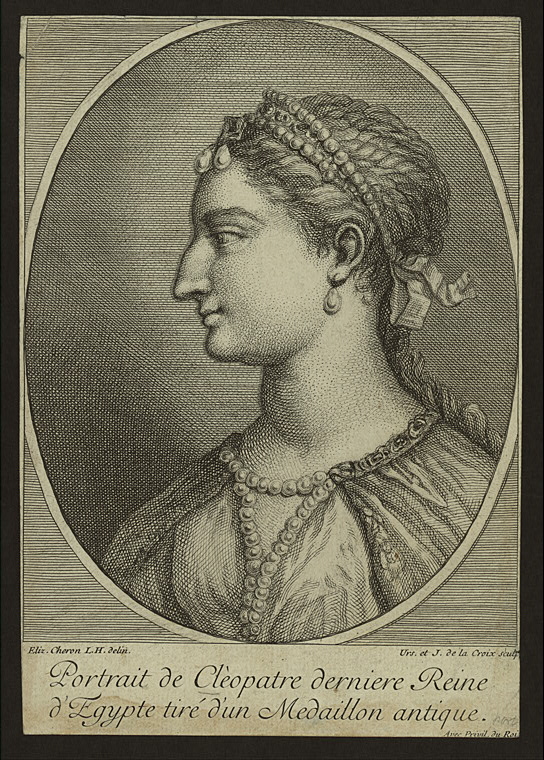When people hear the name Cleopatra, they often associate this name with a woman whose charms and seduction powers led her to bedazzle two of the most powerful men in Roman history, Julius Caesar, and Mark Antony. But what were her intentions in her entanglements with these two important historical figures? Roman history portrays her as a woman “foolish enough to think that she might one day rule Rome, and devious enough to lure a decent man (Caesar) away from his heart and home.” 1 This depiction, however, does not entirely describe the woman who could control and keep one of the most significant empires in history. Cleopatra’s relationships with Julius Caesar and Mark Antony provided her with resources to reestablish a strong Egyptian empire, which, despite her efforts, would later come to an end with her death. Cleopatra’s portrayal in history has been limited to her relationship with these two Roman generals, and Roman historians have generally given her a bad reputation.2 There has been little emphasis on other aspects of her life, her accomplishments, and her reign as the last queen of the Egyptian empire.

Cleopatra VII was the last monarch of Egypt, and many would think that she was, therefore, Egyptian, but what many may not know is that she was actually Greek. Born in Alexandria, Egypt, Cleopatra was a direct descendant of the Macedonian Ptolemaic dynasty.3 The Ptolemies had ruled Egypt since the death of Alexander the Great in the early fourth century B.C.E. Cleopatra was not only the last monarch of Egypt but also the last Ptolemaic ruler.4 She was also the only Ptolemaic ruler who learned the Egyptian language.5
When Ptolemy XII Auletes (Cleopatra’s father) died in 51 B.C.E., the throne of Egypt was taken by the seventeen-year-old Cleopatra and her brother, the ten-year-old Ptolemy. The two of them then ruled as Cleopatra VII and Ptolemy XIII.6 Brother and sister ruling together did not mean problems would be limited. In fact, a few years after Cleopatra and Ptolemy took the throne of Egypt, Ptolemy started a new dating system, and he also claimed sole rule of Egypt from his father’s death. In the summer of 49 B.C.E., Cleopatra’s name disappeared from all Egyptian official documents, and Ptolemy XIII proclaimed himself as the sole ruler of Egypt, forcing Cleopatra to leave Alexandria.7 This event was what led her to meet Julius Caesar. As a Roman officer, Caesar had the power of intervening in the problems between Cleopatra and her brother. His attempts would have been successful if not for the intervention of Ptolemy’s allies who opposed allowing Cleopatra to rule again. After the known Alexandrian War, Cleopatra was restored by Caesar to the throne of Egypt after the death of her brother Ptolemy XIII in the war.8 These events started Cleopatra’s relationship with Caesar, a romance from which Caesarion, the first son of Cleopatra, was the fruit. Cleopatra’s relationship with Caesar not only gave her back control over Egypt, but it also meant protection from Rome; and for Caesar, it meant an access to Egypt’s wealth.9

Besides the power she gained from her relationship with Caesar, Cleopatra’s marriage with Mark Antony, after Caesar’s death, led her to accomplish the restoring of the Egyptian empire. Mark Antony believed that the greatness of the Roman empire “consisted more in giving than taking.”10 Based on this belief, Antony gave his new wife, Cleopatra, extensions of land stretching from the Mediterranean coast, “from Cilicia, through Syria and Phoenicia, large past of Judaea, Lebanon and the Arab state of Ituraea.”11 Cleopatra’s intentions in restoring Egypt were also manifested by the names she chose for her children. Her first son, Caesarion, was named after Julius Caesar, claiming that her son was indeed the son of this important Roman figure.12 She also had three more children with Mark Antony. Their names also reflected Cleopatra’s ambitions. The twins, Alexander Helios and Cleopatra Selene, were named in honor of her family lineage. Alexander Helios was named after Alexander the Great as the sun god Helios. This character represented the role model of Ptolemy III, who extended the power of the Ptolemaic rulers to its greatest extent. In the same way, the name of Cleopatra Selene was inspired from the goddess Isis, a figure that had represented and ruled most of the region within the Ptolemaic and Seleucid lineage. For this reason, Cleopatra Selene was the most convenient name to manifest Cleopatra’s attempts to unify Egypt and Syria under her control.13 Her last child was named Ptolemy Philadelphus, named after the man who had ruled the territories she obtained when she married with Mark Antony.14

Cleopatra’s relationship with Mark Antony, although it gave her power and control over a large number of territories, also brought the end of her reign and, consequently, the end of the Egyptian empire. When Antony established that Caesarion and his three children with Cleopatra would rule Egypt and the Roman provinces in Asia minor, Octavian, adoptive child of Caesar and Antony’s first wife’s half-brother, declared war on both Antony and Cleopatra. The known Battle of Actium in 31 B.C.E. went badly for Antony, and it started the fall of Egypt and her queen. When Cleopatra realized her defeat was inevitable, she committed suicide in 30 B.C.E., marking the end of the Ptolemaic rule and the fall of Egypt to Roman control.15

Undoubtedly, Cleopatra was very intelligent in relating with both Julius Caesar and Mark Antony, and by consequence obtaining great power and control. She may have recognized that the aid of two of the most important Roman generals could eventually lead her to achieve her ambitions of extending the Egyptian empire.16 However, she never accomplished her intentions. Her ambitions were strongly highlighted by her relationship with the two Roman generals, and these two men provide her with the resources she needed to obtain the establishment of a stronger Egypt. Her determination in achieving what she aimed for is admirable.
Although Roman history has portrayed her as a bad woman dangerous for Rome, as followed by the propaganda of Octavian,17 Cleopatra not only related herself with two of the most important men in Roman history, but she also created a pathway towards the unification of a kingdom. She might have been successful if not for the events that led to the fall of her reign.
- Joyce A. Tyldesley, Cleopatra: Last Queen of Egypt (New York: Basic Books, 2008), 206. ↵
- Salem Press Biographical Encyclopedia, January 2015, s.v. “Cleopatra VII,” by Frances Stickney Newman. ↵
- J. Fletcher, Cleopatra the Great: The Woman behind the Legend (New York: HarperCollins, 2011), I. ↵
- Salem Press Biographical Encyclopedia, January 2015, s.v. “Cleopatra VII,” by Frances Stickney Newman. ↵
- Salem Press Encyclopedia, January 2015, s.v. “Ptolemaic Dynasty,” by Milton Berman. ↵
- Salem Press Biographical Encyclopedia, January 2015, s.v. “Cleopatra VII,” by Frances Stickney Newman. ↵
- Tyldesley, Cleopatra: Last Queen of Egypt, 48. ↵
- Salem Press Biographical Encyclopedia, January 2015, s.v. “Cleopatra VII,” by Frances Stickney Newman. ↵
- Tyldesley, Cleopatra: Last Queen of Egypt, 57. ↵
- Fletcher, Cleopatra the Great: The Woman behind the Legend, 268. ↵
- Fletcher, Cleopatra the Great: The Woman behind the Legend, 268. ↵
- Salem Press Biographical Encyclopedia, January 2015, s.v. “Cleopatra VII,” by Frances Stickney Newman. ↵
- Fletcher, Cleopatra the Great: The Woman behind the Legend, 264. ↵
- Fletcher, Cleopatra the Great: The Woman behind the Legend, 270. ↵
- Salem Press Biographical Encyclopedia, January 2015, s.v. “Cleopatra VII,” by Frances Stickney Newman. ↵
- Salem Press Biographical Encyclopedia, January 2015, s.v. “Cleopatra VII,” by Frances Stickney Newman. ↵
- For a clear example of Octavian’s propaganda, see Book IV of Virgil’s Aeneid and his portrayal of the African queen of Carthage, Dido. ↵



58 comments
Meadow Arriaga
I love the description of Cleopatra in this article. I think it really outlines the type of woman she was with all the information given. It is a shame when an individuals controversial events are blasted and the good parts of the person is kept quiet. I can only imagine the struggle women faced in an early time. Cleopatra made a huge impact for her own life with her own choices, which takes courage.
Christopher Hohman
Nice article. Cleopatra was certainly a very intelligent woman. It was said that it was her intellect that captured the attention of both Ceaser and Marc Antony not necessarily her great beauty. She managed not only to preserve her empire for a much longer amount of time than other rulers, but she also enlarged it at the expense of Roman territories. She used her intelligence and powers of seduction to seduce two of the most powerful men in the ancient world because she understood those to be her most powerful tools.
Pamela Callahan
I can’t believe Cleopatra’s brother stole her right to rule over Egypt and then she got Caesar to kill her brother so she could rule again. This was such a crazy story! I found it very interesting to read about the history of Cleopatra rather than just hear about the relationships that she had. This article made me realize that all we ever learn is about her relationships with the men in her life and not about just her as an individual, and that is why I appreciated and enjoyed reading this article.
Madison Guerra
This article was very well written and interesting. Before reading this article i had no prior knowledge of the good things she did while she ruled. She was portrayed as such a bad woman and nobody ever gave her the credit she deserved. She seems to have actually been a great ruler with good intentions.
Eric Ortega Rodriguez
This was a very fascinating article. We often hear a lot about Julius Caesar and Mark Antony in high school, but we do not really hear much on Cleopatra VII. When we do, she is often seen in a negative light. I find it interesting to learn that Cleopatra was actually Greek. I also find it interesting how intelligent Cleopatra was, that when it came to achieving her goals, she always kept them in mind and would do anything to reach them. I also find the meanings behind the names of her children very fascinating. Overall, this was a very well written article with an excellent topic selection.
Sienna Guerra
This article was fantastic! I really enjoyed learning about the wisdom that Cleopatra has and how smart she is. It is strange to know that many saw her as a crazy and bad woman but her attribution to the kingdom by its unification and knowledge she had is unseen! Cleopatra is an underrated woman who had both brains and power all in one spirit.
Gabriela Ochoa
I have read another article about Cleopatra that talked of her relationships with Caesar and Antony but it only talked of the relationships she had with these men. I liked that your article elaborated more on who she was and how she did everything she could to protect her kingdom. I felt that she was a very strong woman in her time and knew what she wanted. Also that she would have been a great ruler if she had the chance to.
Daniela Duran
I really enjoyed reading this article. Cleopatra’s wisdom, and her amazingly smart moves are admirable. It is sand to think that many scholars regard her as a “bad” woman, as you said, and forget to attribute her great intelligence, and her good intentions of unifying a kingdom. I like how she took every decision strategically, thinking about how she could get some benefit from it…She even picked the names of her kids with a purpose! In my opinion, this only demonstrates what a smart, futuristic and perhaps astute woman Cleopatra was!
Raymond Nash Munoz III
I recently read another article on Cleopatra and it’s great to see that the ideas of who she was aligns similarly between this article and the other. When reading many articles, whether on this site or elsewhere, I often have to wonder how valid the information is. Though my questions of validation are best answered when I read multitude of great articles. This author goes more in depth with Cleopatra herself and truly demonstrates the high level of research skills the author possesses. Great job!
Ysenia Rodriguez
Cleopatra has been associated with this “bad woman,” however, after reading this article, her intentions proved to be for the well-being of Rome. In an attempt for the unification of Egypt, she created powerful ties with Julius Caesar and Mark Anthony and did her best for her kingdom. It’s sad to think her legacy was tarnished by the propaganda of Octavian, but I believe this well-written article gave justice to her name and accomplishments as Queen of Egypt.